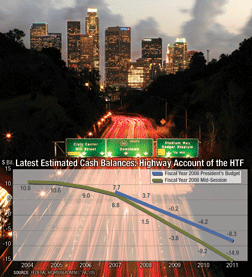| + click to enlarge |
 |
Gloomier new forecasts from the Office of Management and Budget predicting wider 2009 deficits in the Highway Trust Fund’s main component are prompting a search for a remedy.
In its mid-session budget review, released July 11, OMB said the trust fund’s highway account would post a $3.8-billion deficit in fiscal 2009, compared with the $200-million gap it had forecast just six months earlier. The picture could be even darker if, as seems likely, Congress raises 2008 highway spending by $631 million over the $39.1 billion the Bush administration proposed.
It’s unclear what factors led to the new estimates. There is speculation that fuel consumption may be declining as use of hybrid vehicles rises. There are indications that heavy-truck sales and sales taxes flowing to the trust fund are down.
Transportation Secretary Mary Peters says the OMB figures are “a stark reminder that we need to reevaluate our policies for funding and operating the nation’s surface transportation network.” Many are awaiting recommendations on transportation finance and policy from congressionally mandated commissions. The first report is due by the year’s end.
Still, a crisis is not imminent. Senate transportation appropriations subcommittee Chairwoman Patty Murray (D-Wash.) says, “There is no question that there is adequate funding in the trust fund to cover our committee’s recommended [$40.2-billion] appropriation for 2008.” But she adds that unless tax committees act, appropriators “may be forced next year to dramatically scale back our investments” in highways. If nothing is done, “We’re going to overdraw our checkbooks before the end of 2009,” says William Buechner, American Road & Transportation Builders Association vice president for economics and research.
Cathy Connor, Parsons Brinckerhoff senior vice president for government affairs, says some may have hoped a trust fund fix could wait until the next highway bill, after 2009. “Clearly if these numbers hold, we’re going to have to deal with it in advance of reauthorization,” she says. Jay Hansen, National Asphalt Pavement Association vice president for government affairs, says, “It’s very serious. We have to do something.”
Industry and state officials warn that if new revenue isn’t added by 2009, there could be a huge cut in federal road spending. They say that because obligations for multiyear highway projects “spend out” slowly, patching a $4-billion hole in 2009 outlays would require slicing obligations $16 billion or more that year.
Congress isn’t likely to slash highway aid $16 billion, which would be about a 40% cut. Industry groups don’t want any cutbacks and are searching for revenue. Some would like to hike the fuels tax, but that would be a non-starter for the White House. Instead, says American Highway Users Federation President Gregory Cohen, “There’s a number of fixes that we’re looking at, all of which do not require a user-fee increase at this time.”
The list includes letting the general Treasury reimburse the trust fund for revenue it loses from state and local governments’ fuel-tax exemptions for vehicles they own. That could add $1 billion a year to the trust fund. Another option is cracking down on fuel-tax evasion.

Post a comment to this article
Report Abusive Comment